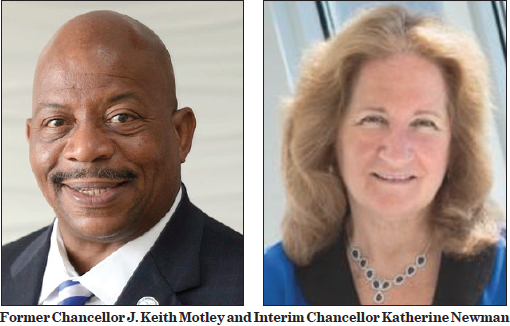June 6, 2019

University of Massachusetts officials and the Pioneer Institute have exchanged sharp volleys over the last week since the free market-oriented think tank published a report placing blame for the financial crisis at the campus at the feet of central university leadership.
The report, “Fiscal Crisis at UMass Boston: The True Story and the Scapegoating,” takes aim at the $30 million deficit identified in a November 2017 UMass Boston audit by firm KPMG LLP (KPMG).
Its authors, Gregory Sullivan and Rebekah Paxton, say the number resulted from an opaque UMass directive rather than a substantive deficit, resulting in an unfair ousting of former chancellor J. Keith Motley.
For their parts, UMass and UMass Boston leadership defended KPMG’s findings and efforts officials have made since to address the issue.
UMass officials made an accounting error in Fiscal year 2016, the Pioneer Institute report asserts, leading the board of trustees to overestimate UMass Boston’s capacity to handle ambitious capital spending plans that the board and President’s Marty Meehan’s office had to approve. When the financial health for the university turned out to be less robust than expected, according to the report, the university was directed to replenish its reserves and began austerity measures.
University representatives pushed back immediately. “When budget issues surfaced at UMass Boston in FY16, system administration went to work on addressing them with the campus and implementing new fiscal accountability and oversight measures to avoid a similar situation in the future,” said UMass spokesman Jeff Cournoyer in a statement. “There was no error in the primary reserve calculation, no directive to replenish reserves, and depreciation expenses have long been reported in budgets, forecasts and financial statements.”
He added, “System office oversight did not ‘trigger’ the UMass Boston deficit any more than water from a fire hose triggers a fire. The Pioneer Institute’s bias is laid bare in this report.”
The Pioneer Institute issued a statement on May 30 defending the report, reiterating its math, and insisting that the UMass administration had made “profoundly inaccurate financial projections” in 2016 in putting UMass Boston campus reserves for 2017 and 2018 at $77.7 million and $92.9 million, then noting that those numbers were downgraded in the fall to $28.1 million and $28.5 million. The Institute’s report asserts that an off-book directive that UMass Boston replenish the reserves accounted for “the vast majority” of the campus deficit.
Interim chancellor Katherine Newman weighed in on the debate by referring back to the KPMG report, which led Meehan to decry the financial management at the campus under Motley’s tenure. Newman is the second interim chancellor. She succeeded Barry Mills, who was brought in post-Motley to grapple with the financial health of the campus.
Of the KPMG deficit findings, Newman wrote in a statement: “These problems were real; they were not an illusion, a mistake, or an accounting error. Collectively they pushed UMass Boston’s reserves to dangerously low levels. Contrary to the Pioneer Institute report, we have never been ordered to replenish them. What the campus has been asked to do is bring the deficit down to zero, which has necessitated painful cuts that everyone wishes were not necessary.”
The years since have seen some firestorms over closed or cut campus centers, parking fees, and debates over the best use for a potential windfall from the sale of the former Bayside Expo Center site.
The Pioneer Institute leveled a specific critique of the KPMG report, regarding its scope, that UMass leaders have not yet addressed. Sullivan and Paxton say the review was not up to audit standards, as it was focused on the campus budgeting process and did not account for any responsibility the UMass board of trustees or Meehan would have in approving the capital plans.
“UMass points to a review by KPMG to rebut the findings of our report,” the Pioneer statement read. “We too respect KPMG, but the reality is that the scope of the review commissioned by UMass leadership was limited to certain procedures at UMass Boston, did not include oversight issues and the role of the university system’s board of trustees and president, and cannot be described as an audit.”
In her statement, Newman expressed doubt that the Institute was legitimately interested in the health of the campus.
“I am mindful that we have more ground to cover before our budget is truly solid and that the sacrifices by individuals, departments, centers/institutes, and programs have been very difficult,” she wrote. “But if we are going to address these issues, we need to do it together and not allow agendas and conspiracy theories from outside groups distract us from our goals.”
She added, “There is nothing in the Pioneer Institute’s long track record that suggests it is supportive of a thriving UMass Boston or our mission. This report is not a defense of UMass Boston. It is an attempt to draw additional negative attention to us on the eve of our Commencement.”


